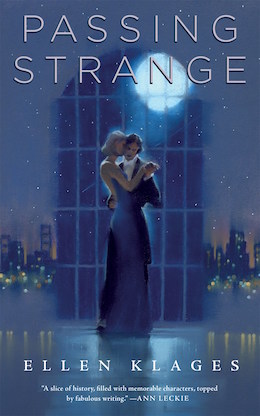In contemporary San Francisco, an elderly woman spends her final afternoon alive retrieving an old and fragile piece of art from storage and selling it to an unscrupulous rare books dealer for mysterious reasons. Then, cut back to the nightlife of 1940s San Francisco, the same woman is party to the introduction of Emily—a young woman who has escaped from family censure—and Haskel, a bisexual artist who paints for the pulps. Emily and Haskel hit it off, as part of a small circle of likeminded women, and their romance takes them to the corners of the Magic City of the World’s Fair, but also to the edge of real magic.
Passing Strange is a queer historical novella with a healthy dose of magical realism—a combination sure to enrapture a specific audience, of which I am certainly one. Klages renders the reality of life for queer women in the ’40s with a matter of fact and honest level of detail. While the novella doesn’t flinch from the difficulties of oppression and abuse, as a whole it has a remarkably uplifting tone: these are women who have made lives together and will continue on into the future, in whatever ways they can.
First and foremost, Passing Strange is lifelike. The majority of the novella focuses on the relationship between Emily and Haskel, with their friends as supporting and illustrative cast; there are also the other queer folks of Mona’s bar, women and men and everything in between as the text notes, and of course the tourists and gawkers and abusive policemen who form the backdrop of everyday queer life under criminalization.
As historical fiction, it fits neatly into a “slice of life” approach: this is not a story about people who changed the course of history, but about normal women living their lives who happen on some useful magic and a future together. On a more personal note, it’s also gripping to see the care with which Klages renders the people who existed across the gender spectrum in this time period—because it’s complicated and contextual, but important. The inclusivity of the text adds another layer of realism to it.
Passing Strange is overall a quiet and personal sort of text. It skates across the surface of its characters’ lives through a series of vignettes, but manages to give us emotional depth at the same time as the group support and love one another. It is understated and human, direct without roughness. Furthermore, this is a text that addresses issues of racism, classism, and homophobia in the ’40s while simultaneously not bearing our characters down under the brunt of their oppression—it remains, in the end, a love story. And these are vibrant, variable women who are very capable of saving each other.
The magic, too, is both naturalistic and uncanny. That simultaneity makes me label it magical realism, but regardless of the tagline we use, it’s effective. There’s not a hint of the supernatural in the text until suddenly Franny uses a piece of paper to fold spacetime and deposit herself and Helen at her house without the mile’s walk. Then, later, the subject is discussed over dinner as a form of science, and later still it’s the plot catalyst for getting Haskel and Emily safely put into another “story” together—one that Haskel herself paints.
The reader only skims the surface of these women’s lives, enough to see one romance bloom and suffer a tragic misstep and then save itself, but somehow I also feel that I know them deeply. Perhaps it’s because Klages illustrates the world with such careful and accurate detail, and her characters move and breathe on the page like real people, but in the end I felt richly satisfied by this novella. For such a predominantly mundane piece of fiction—and it is mundane, daily in its approach—it nonetheless strikes a chord that echoes after finishing. It’s subtle and thorough, but delicate. Klages has done a stellar job, here.
Passing Strange is available from Tor.com Publishing.
Read an excerpt from the novella here on Tor.com.
Lee Mandelo is a writer, critic, and editor whose primary fields of interest are speculative fiction and queer literature, especially when the two coincide. They have two books out, Beyond Binary: Genderqueer and Sexually Fluid Speculative Fiction and We Wuz Pushed: On Joanna Russ and Radical Truth-telling, and in the past have edited for publications like Strange Horizons Magazine. Other work has been featured in magazines such as Stone Telling, Clarkesworld, Apex, and Ideomancer.










